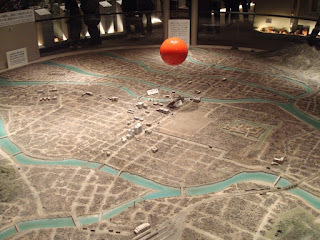The bomb was nick-named "Little Boy" by the crew who was ordered to drop it. The aircraft that flew the mission over Hiroshima was called "Enola Gay." The name "Hiroshima" means "Wide Island(s)" in Japanese. The population of the city on August 6, 1945 was approximately 381,000 people. The explosion that occurred at 8:16 am that day killed between 70,000 and 80,000...we'll never know for sure. Among the dead were 20,000 Japanese soldiers. The injured numbered an additional 70,000.
The bombing of Hiroshima is an important event in world history, obviously.
First of all, as I stated at the top of this post, it literally began the Atomic Age. Radiation was not something the majority of the world knew about before August 6. Afterwards, it became something that only a small minority of people all over the world do NOT know about. The atomic bomb begat the hydrogen bomb which begat a nuclear arsenal that can destroy the world a dozen times over. On the lighter side, it gave us Godzilla, as well as Spider-Man and most of the Marvel Universe.
 |
| The red ball represents where the bomb actually exploded |
Another concept that was rationalized by the bombing of Hiroshima was the idea of "All Out War." No longer were civilian targets automatically off the list of possible attack sites. Following closely on the heels of the Fire Bombing of Dresden (February 1945) which led, in part, to German capitulation, the atomic bombing of Hiroshima and Nagasaki could be said to be the worst examples of "collateral damage." In what I consider a moral lapse, both of these attacks were by the Allies on the Axis powers. In this sense we traipse dangerously close to the idea that "if we are doing it, it isn't wrong."
This, of course, leads directly to the argument that the bombings of Hiroshima and Nagasaki saved millions of Allied lives by ending the war. While it is true that the war ended after the second bomb was dropped, this is a specious argument, as we will never know what would have happened if they had *not* been dropped.
What we do know is that because of the events of August 1945 the United States and Japan began a dance that they are still doing to this day.
 |
| The Peace Memorial Ceremony Aug 6, 2014 |
On the other hand, Japan as a nation has embraced pacifism to the point of victimhood. A large majority of the citizenry shouts "No More Hiroshimas!" as the government is Constitutionally forbidden to maintain standing armed forces. (Instead they have a Self-Defense Force, which is forbidden to leave Japanese soil or Japanese controlled waters without government permission.)
This in turn complicates Japan's relationships with other Asian nations, especially China and Korea. Japan wants to play the victim card to two countries that they invaded and attempted to overthrow during World War II. Japan stands up at international conferences and notes that they are the only nation on Earth to have been a victim of atomic weapons; this is true, but they say it as if that should excuse the raping, pillaging, and murdering that they committed before August 1945. Just as one example: during the Japanese dictatorial government rule of Korea, they actually made it illegal for Korean citizens to learn Korean. It was a criminal offense. And yet the current Japanese government (and people, to some extent) find it hard to believe that the Koreans don't like them! "Oh, look at us," they seem to say, "we were bombed, too."
In the past sixty plus years only two US Ambassadors to Japan have ever attended the Hiroshima Peace Memorial Ceremony, held every year on August 6 at Hiroshima Peace Memorial Park. I was lucky enough to attend the ceremony when I was an exchange student. living in Hiroshima. And although I personally do not feel any guilt about the decision to destroy the city of Hiroshima, I do believe that it was a terrible, tragic day that should not be forgotten.




No comments:
Post a Comment